2014年6月六级听力真题及答案(第二套)
2014年6月大学英语六级考试真题含答案解析
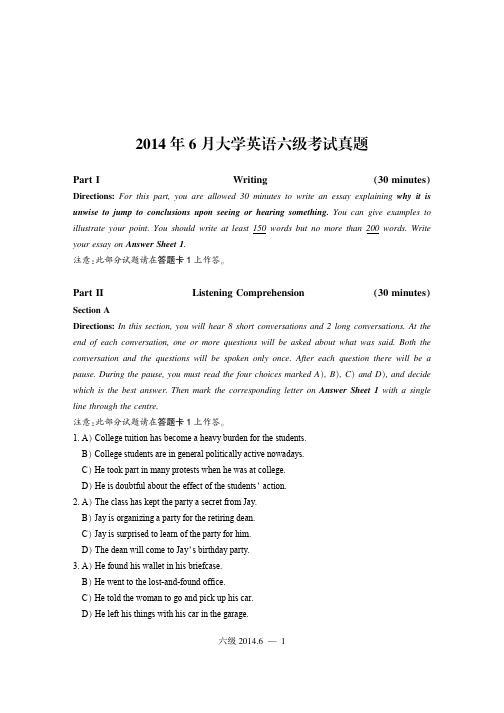
12. A冤 A year of practical training.
B冤 A happy childhood.
六级 2014.6 要 2
C冤 A pleasant neighbourhood.
D冤 A good secondary education.
13. A冤 He is good at carpentry.
D冤 He didn爷t expect to complete his work so soon.
8. A冤 He has failed to register for the course.
B冤 He would like to major in psychology too.
C冤 There should be more time for registration.
11. A冤 It will start tomorrow.
B冤 It will last only one day.
C冤 It will be out into the countryside.
D冤 It will be on the following weekend.
Questions 12 to 15 are based on the conversation you have just heard.
which is the best answer. Then mark the corresponding letter on Answer Sheet 1 with a single
line through the centre.
注意院此部分试题请在答题卡 1 上作答遥
1. A冤 College tuition has become a heavy burden for the students.
2014年6月大学英语六级真题及-答案完整版
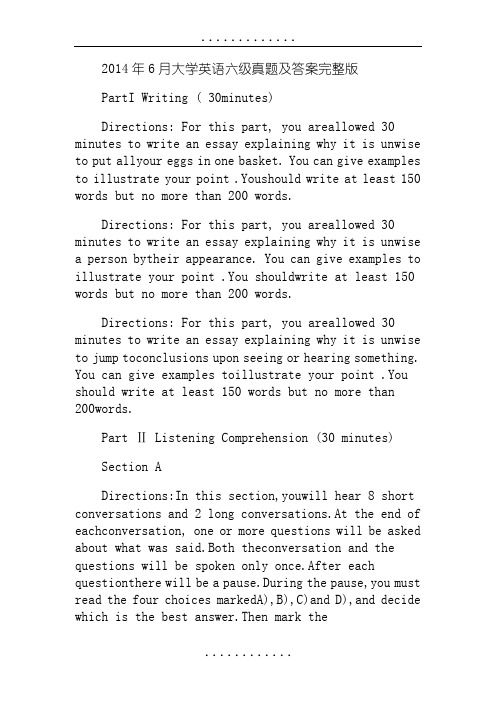
2014年6月大学英语六级真题及答案完整版PartI Writing ( 30minutes)Directions: For this part, you areallowed 30 minutes to write an essay explaining why it is unwise to put allyour eggs in one basket. You can give examples to illustrate your point .Youshould write at least 150 words but no more than 200 words.Directions: For this part, you areallowed 30 minutes to write an essay explaining why it is unwise a person bytheir appearance. You can give examples to illustrate your point .You shouldwrite at least 150 words but no more than 200 words.Directions: For this part, you areallowed 30 minutes to write an essay explaining why it is unwise to jump toconclusions upon seeing or hearing something. You can give examples toillustrate your point .You should write at least 150 words but no more than200words.Part Ⅱ Listening Comprehension (30 minutes)Section ADirections:In this section,youwill hear 8 short conversations and 2 long conversations.At the end of eachconversation, one or more questions will be asked about what was said.Both theconversation and the questions will be spoken only once.After each questionthere will be a pause.During the pause,you must read the four choices markedA),B),C)and D),and decide which is the best answer.Then mark thecorrespondingletter on Answer Sheet1 with a single line through the centre.注意:此部分试题请在答题卡1上作答。
2014年大学英语CET6真题听力、答案及原文(6月)
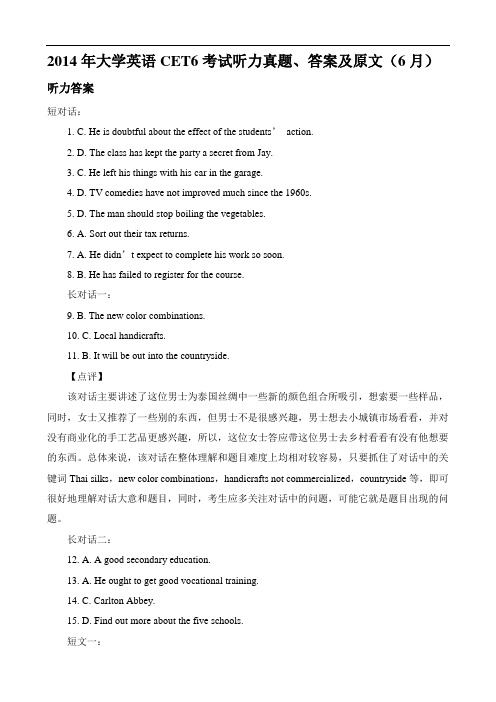
2014年大学英语CET6考试听力真题、答案及原文(6月)听力答案短对话:1. C. He is doubtful about the effect of the students’action.2. D. The class has kept the party a secret from Jay.3. C. He left his things with his car in the garage.4. D. TV comedies have not improved much since the 1960s.5. D. The man should stop boiling the vegetables.6. A. Sort out their tax returns.7. A. He didn’t expect to complete his work so soon.8. B. He has failed to register for the course.长对话一:9. B. The new color combinations.10. C. Local handicrafts.11. B. It will be out into the countryside.【点评】该对话主要讲述了这位男士为泰国丝绸中一些新的颜色组合所吸引,想索要一些样品,同时,女士又推荐了一些别的东西,但男士不是很感兴趣,男士想去小城镇市场看看,并对没有商业化的手工艺品更感兴趣,所以,这位女士答应带这位男士去乡村看看有没有他想要的东西。
总体来说,该对话在整体理解和题目难度上均相对较容易,只要抓住了对话中的关键词Thai silks,new color combinations,handicrafts not commercialized,countryside等,即可很好地理解对话大意和题目,同时,考生应多关注对话中的问题,可能它就是题目出现的问题。
2014年6月大学英语六级真题及答案真题+听力原文+答案详解.docx

2014 年 6 月英语六级真题及答案Part I WritingDirections: For this part, you are allowed 30 minutes to write a short essay on the topic of Due Attention Should Be Given to the Study of Chinese Yo u should write at Chinese. least 120 words following the outline given belo w:1.近年来在学生中出现了忽视中文学习的现象;2.出现这种现象的原因和后果;3我认为,Given Due Attention Should Be Given to the Study of ChinesePart II Reading Comprehension (Skimming and Scanning) (15 minute s)Directions: In this part, you will have 15 minutes to go over the passage qu ickly and answer the questions on Answer sheet 1. For questions 1-7, choo se the best answer from the four choices marked A), B), C) and D). For qu estions 8-10, complete the sen-tences with the information given in the pas sage. Welcome,Freshmen. Have an iPod.Taking a step that many professors may view as a bit counterproductive, so me colleges and universities are doling out Apple iPhones and Internet-cap able iPods to their students.The always-on Internet devices raise some novel possibilities, like tracking where students gather together. With far less controversy, colleges could s end messages about canceled classes, delayed buses, campus crises or just the cafeteria menu.While schools emphasize its usefulness —online research in class and inst ant polling of students, for example — a big part of the attraction is, undou btedly, that the iPhone is cool and a hit with students. Being equipped with one of the most recent cutting-edge IT products could just help a college o r university foster a cutting-edge reputation.Apple stands to win as well, hooking more young consumers with decadesof technology pur- chases ahead of them. The lone losers, some fear, could be professors.Students already have laptops and cell phones, of course, but the newest de vices can take class distractions to a new level. They practically beg a user to ignore the long-suffering professor strug- gling to pass on accumulated wisdom from the front of the room — a prospect that teachers find most irr itating and students view as, well, inevitable.“ When it gets a little boring, I might pull it out,‖acknowledged Naomi P ugh, a first-year student at Freed-Hardeman University in Henderson, Ter m., referring to her new iPod Touch, which can connect to the Internet ove r a campus wireless network. She speculated that professors might try even harder to make classes interesting if they were to compete with the devices. Experts see a movement toward the use of mobile technology in educati on, though they say it is in its infancy as professors try to come up with us eful applications. Providing powerful hand- held devices is sure to fuel deb ates over the role of technology in higher education.“ We think this is the way the future is going to work,‖said Kyle Dickson, co-director of re- search and the mobile learning initiative at Abilene Chris tian University in Texas, which has bought more than 600 iPhones and 300 iPods for students entering this fall.Although plenty of students take their laptops to class, they don’t take the m everywhere and would prefer something lighter. Abilene Christian settle d on the devices after surveying students and finding that they did not like hauling around their laptops, but that most of them always carried a cell ph one, Dr. Dickson said.It is not clear how many colleges and universities plan to give out iPhones and iPods this fall; officials at Apple were unwilling to talk about the subje ct and said that they would not leak any institution plans’s.“ We can’t announce other people’s news,‖saidGreg Joswiak, vice presid ent of iPod and iPhone marketing at Apple. He also said that he could not d iscuss discounts to universities for bulk purchases.At least four institutions — the University of Maryland, Oklahoma Christi an University, Abilene Christian and Freed-Hardeman — have announced t hat they will give the devices to some or all of their students this fall.Other universities are exploring their options. Stanford University has hire d a student-run com-pany to design applications like a campus map and dir ectory for the iPhone. It is considering whether to issue iPhones but not sur e it, snecessary, noting that more than 700 iPhones were registered on the u niversity network’s last year.At the Massachusetts Institute of Technology, iPhones might alreadyhave been everywhere, if AT&T, the wireless carrier offering the iPhone in the United States,had a more reliable network, said Andrew Yu, mobile devices platform pro ject manager at M.I.T.“ We would have probably gone ahead with this, maybe just getting a thou sand iPhones and giving them out, ‖Mr. Yusaid.The University of Maryland at College Park is proceeding cautiously, givi ng the iPhone or iPod Touch to 150 students, said Jeffrey Huskamp, vice p resident and chief information officer at the university. ― Wedon’t think tha t we have all the answers, Mr‖. Huskamp said. By observing how students use the gadgets, he said,― We’ retrying to get answers from the students. ‖ At each college, the students who choose to get an iPhone must pay for mo bile phone service. Those service contracts include unlimited data use. Both the iPhones and the iPod Touch devices can connect to the Internet throu gh campus wireless networks. With the iPhone, those networks may provid e faster connections and longer battery life than A T&T’s data network. Many cell phones allow users to surf the Web, but only some newer ones are c apable of wireless connection to the local area computer network. University officials say that they have no plans to track their students (and Apple said it would not be possible unless students give their permission). They say that they are drawn to the prospect of learning applications outsid e the classroom, though such lesson plans have yet to surface.“ My colleagues and I are studying something called augmented reality (a field of computer research dealing with the combination of real-world and virtual reality), said‖ Christopher Dede, professor in learning technologies at Harvard University. ― AlienContact, for‖ example, is an exer- cise develo ped for middle-school students who use hand-held devices that can determi ne their location. As they walk around a playground or other area, text, vid eo or audio pops up at various points to help them try to figure out why ali ens were in the schoolyard.“ You can imagine similar kinds of interactive activities along historical li nes, ‖like following the Freedom Trail in Boston, Professor Dede said.― It’s important that we do research, so that we know how well something like this works. ‖The rush to distribute the devices worries some professors, who say that st udents are less likely to participate in class if they are multi-tasking. ― I ’m n ot someone who’s anti-technology, but I,m always worried that technology becomes an end in and of itself, and it replaces teaching or it replaces analysis,, said’Ellen Millender, associate professor of classics at Reed College in Portland, Ore. (She added that she hoped to buy an iPhone for herself on ce prices fall.)Robert Summers, who has taught at Cornell Law School for about 40 years,announced this week — in a detailed, footnoted memorandum — that he would ban laptop computers from his class on contract law.“ I would ban that too if I knew the students were using it in class, Profes‖sor Summers said of the iPhone, after the device and its capabilities were e xplained to him. ― Whatwe want to encour- age in these students is an activ e intellectual experience, in which they develop the wide range of complex reasoning abilities required of good lawyers. ‖The experience at Duke University may ease some concerns. A few years a go, Duke began giving iPods to students with the idea that they might use t hem to record lectures (these older models could not access the Internet).“ We had assumed that the biggest focus of these devices would be consu ming the content, said‖ Tracy Futhey, vice president for informationtechn ology and chief information officer at Duke.But that is not all that the students did. They began using the iPods to creat e their own ― content, making‖ audio recordings of themselves and presenti ng them. The students turned what could have been a passive interaction in to an active one, Ms. Futhey said. 注意:此部分试题请在答题卡 1 上作答。
2014年6月英语六级真题及答案(第二套)
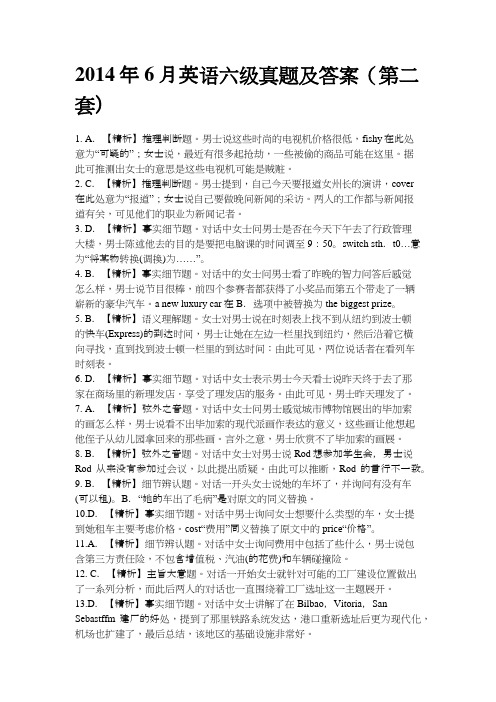
2014年6月英语六级真题及答案(第二套)1. A.【精析】推理判断题。
男士说这些时尚的电视机价格很低,fishy在此处意为“可疑的”;女士说,最近有很多起抢劫,一些被偷的商品可能在这里。
据此可推测出女士的意思是这些电视机可能是贼赃。
2. C.【精析】推理判断题。
男士提到,自己今天要报道女州长的演讲,cover在此处意为“报道”;女士说自己要做晚间新闻的采访。
两人的工作都与新闻报道有关,可见他们的职业为新闻记者。
3. D.【精析】事实细节题。
对话中女士问男士是否在今天下午去了行政管理大楼,男士陈述他去的目的是要把电脑课的时间调至9:50。
switch sth.t0…意为“将某物转换(调换)为……”。
4. B.【精析】事实细节题。
对话中的女士问男士看了昨晚的智力问答后感觉怎么样,男士说节目很棒,前四个参赛者都获得了小奖品而第五个带走了一辆崭新的豪华汽车。
a new luxury car在B.选项中被替换为the biggest prize。
5. B.【精析】语义理解题。
女士对男士说在时刻表上找不到从纽约到波士顿的快车(Express)的到达时间,男士让她在左边一栏里找到纽约,然后沿着它横向寻找,直到找到波士顿一栏里的到达时间:由此可见,两位说话者在看列车时刻表。
6. D.【精析】事实细节题。
对话中女士表示男士今天看士说昨天终于去了那家在商场里的新理发店.享受了理发店的服务。
由此可见,男士昨天理发了。
7. A.【精析】弦外之音题。
对话中女士问男士感觉城市博物馆展出的毕加索的画怎么样,男士说看不出毕加索的现代派画作表达的意义,这些画让他想起他侄子从幼儿园拿回来的那些画。
言外之意,男士欣赏不了毕加索的画展。
8. B.【精析】弦外之音题。
对话中女士对男士说Rod想参加学生会,男士说Rod从来没有参加过会议,以此提出质疑。
由此可以推断,Rod的言行不一致。
9. B.【精析】细节辨认题。
对话一开头女士说她的车坏了,并询问有没有车(可以租)。
2014年6月大学英语六级考试真题含答案解析

D冤 Put Keith in a good boarding school.
Section B
Directions: In this section, you will hear 3 short passages. At the end of each passage, you will
hear some questions. Both the passage and the questions will be spoken only once. After you
2. A冤 The class has kept the party a secret from Jay.
B冤 Jay is organizing a party for the retiring dean.
C冤 Jay is surprised to learn of the party for him.
11. A冤 It will start tomorrow.
B冤 It will last only one day.
C冤 It will be out into the countryside.
D冤 It will be on the following weekend.
Questions 12 to 15 are based on the conversation you have just heard.
B冤 He is academically gifted.
C冤 He should be sent to a private school.
D冤 He ought to get good vocational training.
14. A冤 Donwell School.
2014年6月六级真题及答案-精心整理版

2014年6月英语六级真题及答案(精心整理版)Part I WritingDirections: For this part, you are allowed 30 minutes to write a short essay on the topic of Due Attention Should Be Given to the Study of Chinese Yo u should write at Chinese. least 120 words following the outline given belo w:1.近年来在学生中出现了忽视中文学习的现象;2.出现这种现象的原因和后果;3我认为…Given Due Attention Should Be Given to the Study of ChinesePart II Reading Comprehension (Skimming and Scanning) (15 minute s)Directions: In this part, you will have 15 minutes to go over the passage qu ickly and answer the questions on Answer sheet 1. For questions 1-7, choo se the best answer from the four choices marked A), B), C) and D). For qu estions 8-10, complete the sen-tences with the information given in the pas sage. Welcome,Freshmen. Have an iPod.Taking a step that many professors may view as a bit counterproductive, so me colleges and universities are doling out Apple iPhones and Internet-cap able iPods to their students.The always-on Internet devices raise some novel possibilities, like tracking where students gather together. With far less controversy, colleges could s end messages about canceled classes, delayed buses, campus crises or just the cafeteria menu.While schools emphasize its usefulness —online research in class and inst ant polling of students, for example — a big part of the attraction is, undou btedly, that the iPhone is cool and a hit with students. Being equipped with one of the most recent cutting-edge IT products could just help a college o r university foster a cutting-edge reputation.Apple stands to win as well, hooking more young consumers with decades of technology pur-chases ahead of them. The lone losers, some fear, could be professors.Students already have laptops and cell phones, of course, but the newest de vices can take class distractions to a new level. They practically beg a user to ignore the long-suffering professor strug-gling to pass on accumulated wisdom from the front of the room — a prospect that teachers find most irr itating and students view as, well, inevitable.“When it gets a little boring, I might pull it out,‖ acknowledged Naomi P ugh, a first-year student at Freed-Hardeman University in Henderson, Ter m., referring to her new iPod Touch, which can connect to the Internet ove r a campus wireless network. She speculated that professors might try even harder to make classes interesting if they were to compete with the devices. Experts see a movement toward the use of mobile technology in educati on, though they say it is in its infancy as professors try to come up with us eful applications. Providing powerful hand-held devices is sure to fuel deb ates over the role of technology in higher education.“We think this is the way the future is going to work,‖ said Kyle Dickson, co-director of re-search and the mobile learning initiative at Abilene Chris tian University in Texas, which has bought more than 600 iPhones and 300 iPods for students entering this fall.Although plenty of students take their laptops to class, they don’t take the m everywhere and would prefer something lighter. Abilene Christian settle d on the devices after surveying students and finding that they did not like hauling around their laptops, but that most of them always carried a cell ph one, Dr. Dickson said.It is not clear how many colleges and universities plan to give out iPhones and iPods this fall; officials at Apple were unwilling to talk about the subje ct and said that they would not leak any institution’s plans.“We can’t announce other people’s news,‖said Greg Joswiak, vice presid ent of iPod and iPhone marketing at Apple. He also said that he could not d iscuss discounts to universities for bulk purchases.At least four institutions — the University of Maryland, Oklahoma Christi an University, Abilene Christian and Freed-Hardeman — have announced t hat they will give the devices to some or all of their students this fall.Other universities are exploring their options. Stanford University has hire d a student-run com-pany to design applications like a campus map and dir ectory for the iPhone. It is considering whether to issue iPhones but not sur e it, snecessary, noting that more than 700 iPhones were registered on the u niversity’s network last year.At the Massachusetts Institute of Technology, iPhones might already have been everywhere, if AT&T, the wireless carrier offering the iPhone in the United States,had a more reliable network, said Andrew Yu, mobile devices platform pro ject manager at M.I.T.“We would have probably gone ahead with this, maybe just getting a thou sand iPhones and giving them out,‖ Mr. Yusaid.The University of Maryland at College Park is proceeding cautiously, givi ng the iPhone or iPod Touch to 150 students, said Jeffrey Huskamp, vice p resident and chief information officer at the university. ―We don’t think tha t we have all the answers,‖ Mr. Huskamp said. By observing how students use the gadgets, he said, ―We’re trying to get answers from the students.‖At each college, the students who choose to get an iPhone must pay for mo bile phone service. Those service contracts include unlimited data use. Bot h the iPhones and the iPod Touch devices can connect to the Internet throu gh campus wireless networks. With the iPhone, those networks may provid e faster connections and longer battery life than AT&T’s data network. Many cell phones allow users to surf the Web, but only some newer ones are c apable of wireless connection to the local area computer network. University officials say that they have no plans to track their students (and Apple said it would not be possible unless students give their permission). They say that they are drawn to the prospect of learning applications outsid e the classroom, though such lesson plans have yet to surface.“My colleagues and I are studying something called augmented reality (a field of computer research dealing with the combination of real-world and virtual reality),‖ said Christopher Dede, professor in learning technologies at Harvard University. ―Alien Contact,‖ for example, is an exer-cise develo ped for middle-school students who use hand-held devices that can determi ne their location. As they walk around a playground or other area, text, vid eo or audio pops up at various points to help them try to figure out why ali ens were in the schoolyard.“You can imagine similar kinds of interactive activities along historical li nes,‖ like following the Freedom Trail in Boston, Professor Dede said. ―It’s important that we do research, so that we know how well something like this works.‖The rush to distribute the devices worries some professors, who say that st udents are less likely to participate in class if they are multi-tasking. ―I’m n ot someone who’s anti-technology, but I,m always worried that technology becomes an end in and of itself, and it replaces teaching or it replaces analysis,,’ said Ellen Millender, associate professor of classics at Reed College in Portland, Ore. (She added that she hoped to buy an iPhone for herself on ce prices fall.)Robert Summers, who has taught at Cornell Law School for about 40 years , announced this week — in a detailed, footnoted memorandum —that he would ban laptop computers from his class on contract law.“I would ban that too if I knew the students were using it in class,‖ Profes sor Summers said of the iPhone, after the device and its capabilities were e xplained to him. ―What we want to encour-age in these students is an activ e intellectual experience, in which they develop the wide range of complex reasoning abilities required of good lawyers.‖The experience at Duke University may ease some concerns. A few years a go, Duke began giving iPods to students with the idea that they might use t hem to record lectures (these older models could not access the Internet). “We had assumed that the biggest focus of these devices would be consu ming the content,‖ said Tracy Futhey, vice president for information techn ology and chief information officer at Duke.But that is not all that the students did. They began using the iPods to creat e their own ―content,‖ making audio recordings of themselves and presenti ng them. The students turned what could have been a passive interaction in to an active one, Ms. Futhey said. 注意:此部分试题请在答题卡1上作答。
2014年6月英语四级真题答案及解析(卷二)
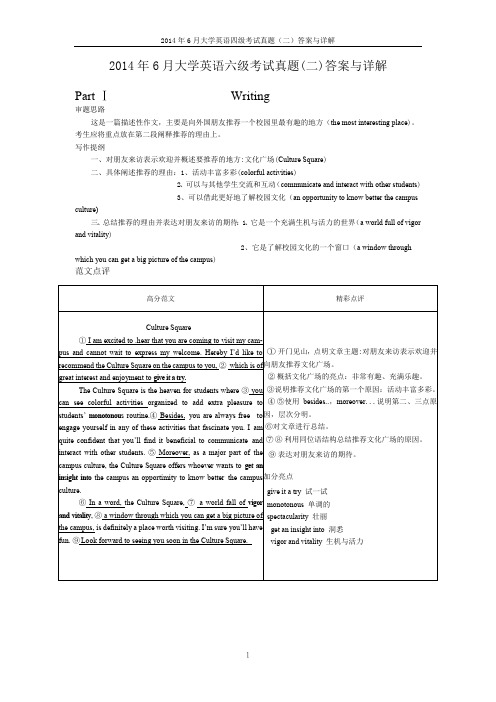
2014年6月大学英语六级考试真题(二)答案与详解Part ⅠWriting审题思路这是一篇描述性作文,主要是向外国朋友推荐一个校园里最有趣的地方(the most interesting place)。
考生应将重点放在第二段阐释推荐的理由上。
写作提纲一、对朋友来访表示欢迎并概述要推荐的地方:文化广场(Culture Square)二、具体阐述推荐的理由:1、活动丰富多彩(colorful activities)2、可以与其他学生交流和互动(communicate and interact with other students)3、可以借此更好地了解校园文化(an opportunity to know better the campus culture)三、总结推荐的理由并表达对朋友来访的期待:1、它是一个充满生机与活力的世界(a world full of vigor and vitality)2、它是了解校园文化的一个窗口(a window through which you can get a big picture of the campus)范文点评高分范文精彩点评Culture Square① I am excited to .hear that you are coming to visit my cam-pus and cannot wait to express my welcome. Hereby I’d like to recommend the Culture Square on the campus to you, ② which is of great interest and enjoyment to give it a try.The Culture Square is the heaven for students where ③ you can see colorful activities organized to add extra pleasure to students’ monotonous routine.④ Besides, you are always free to engage yourself in any of these activities that fascinate you. I am quite confident that you’ll find it beneficial to communicate and interact with other students. ⑤Moreover, as a major part of the campus culture, the Culture Square offers whoever wants to get an insight into the campus an opportimity to know better the campus culture.⑥In a word, the Culture Square, ⑦ a world fall of vigor and vitality, ⑧ a window through which you can get a big picture of the campus, is definitely a place worth visiting. I’m sure you’ll have fun. ⑨ Look forward to seeing you soon in the Culture Square. ①开门见山,点明文章主题:对朋友来访表示欢迎并向朋友推荐文化广场。
- 1、下载文档前请自行甄别文档内容的完整性,平台不提供额外的编辑、内容补充、找答案等附加服务。
- 2、"仅部分预览"的文档,不可在线预览部分如存在完整性等问题,可反馈申请退款(可完整预览的文档不适用该条件!)。
- 3、如文档侵犯您的权益,请联系客服反馈,我们会尽快为您处理(人工客服工作时间:9:00-18:30)。
Part II Listening Comprehension (30 minutes)Section ADirections: In this section,you will hear 8 short conversations and 2 long conversations.At the end of each conversation,one or more questions will be asked about what was said.Both the conversation and the questions will be spoken only once.After each question there will be a pause.During the pause,you must read the four choices marked A),B),C)and D),and decide which is the best answer,Then mark the corresponding letter on Answer Sheet 1 with a single line through the centre.注意:此部分试题请在答题卡1上作答。
1. A) They might be stolen goods.B) They might be fake products.C) They might be faulty products.D) They might be smuggled goods.2. A) They are civil servants.B) They are job applicants.C) They are news reporters.D) They are public speakers.3. A) The man has decided to quit his computer class.B) The woman wants to get a degree in administration.C) A computer degree is a must for administrative work.D) The man went to change the time of his computer class.4. A) A lot of contestants participated in the show.B) The fifth contestant won the biggest prize.C) It was not as exciting as he had expected.D) It was sponsored by a car manufacturer.5. A) Reading a newspaper column.B) Looking at a railway timetable.C) Driving from New York to Boston.D) Waiting for someone at the airport.6. A) He wears a coat bought in the mall.B) He got a new job at the barbershop.C) He had a finger hurt last night.D) He had his hair cut yesterday.7. A) He cannot appreciate the Picasso exhibition.B) Even his nephew can draw as well as Picasso.C) He is not quite impressed with modem paintings.D) Some drawings by kindergarten kids are excellent.8. A) He should not put the cart before the horse.B) His conduct does not square with his words.C) His attitude to student government has changed.D) He has long been involved in student government.Questions 9 to 11 are based on the conversation you have just heard.9. A) She left her own car in Manchester.B) Something went wrong with her car.C) She wants to go traveling on the weekend.D) Her car won't be back in a week's time.10. A) Safety. B) Comfort. C) Size. D) Cost.11. A) Third-party insurance.B) Value-added tax.C) Petrol.D) CDW.Questions 12 to 15 are based on the conversation you have just heard.12. A) How to update the basic facilities.B) What to do to enhance their position.C) Where to locate their plant.D) How to attract investments.13. A) Their road link to other European countries is fast.B) They are all located in the south of France.C) They are very close to each other.D) Their basic facilities are good.14. A) Try to avoid making a hasty decision.B ) Take advantage of the train links.C) Talk with the local authorities.D) Conduct field surveys first.15. A) Future product distribution.B) Local employment policies.C) Road and rail links for small towns.D) Skilled workforce in the hilly region.Section BDirections: In this section, you will hear 3 short passages. At the end of each passage, you will hear some questions. Both the passage and the questions will bespoken only once. After you hear a question, you must choose the best answer from the four choices marked A), B), C) and D). Then mark the corresponding letter on Answer Sheet 1 with a single line through the centre.注意:此部分试题请在答题卡1上作答。
Passage oneQuestions 16 to 18 are based on the passage you have just heard.16. A) One fifth of them were on bad terms with their sisters and brothers.B) About one eighth of them admitted to lingering bitter feelings.C) More than half of them were involved in inheritance disputes.D) Most of them had broken with their sisters and brothers.17. A) Less concern with money matters.B) More experience in worldly affairs.C) Advance in age.D) Freedom from work.18. A) They have little time left to renew contact with their brothers and sisters.B) They tend to forget past unhappy memories and focus on their present needs.C) They are more tolerant of one another.D) They find close relatives more reliable.Passage TwoQuestions 19 to 22 are based on the passage you have just heard.19. A) They have bright colors and intricate patterns.B) They can only survive in parts of the Americas.C) They are the only insect that migrates along fixed routes.D) They have strong wings capable of flying long distances.20. A) In a Michigan mountain forest.B) In a Louisiana mountain forest.C) In a Kentucky mountain forest.D) In a Mexican mountain forest.21. A) Each flock of butterflies lays eggs in the same states.B) They start to lay eggs when they are nine months old.C) Each generation in a cycle lays eggs at a different place.D) Only the strongest can reach their destination to lay eggs.22. A) Evolution of monarch butterflies.B) Living habits of monarch butterflies.C) Migration patterns of monarch butterflies.D) Environmental impacts on monarch butterfly life.Passage ThreeQuestions 23 to 25 are based on the passage you have just heard.23. A) Time has become more limited.B) Time has become more precious.C) Time is money.D) Time is relative.24. A) Americans now attach more importance to the effective use of time.B) Americans today have more free time than earlier generations.C) The number of hours Americans work has increased steadily.D) More and more Americans feel pressed for time nowadays.25. A) Our interpersonal relationships improve.B) Our work efficiency increases greatly.C) Our living habits are altered.D) Our behavior is changed.Section CDirections: In this section, you will hear a passage three times. When the passage is read for the first time,you should listen carefully for its general idea.When the passage is read for the second time,you are required to fill in the blanks with the exact words you have just heard. Finally,when the passage is read for the third time,you should check what you have written.注意:此部分试题请在答题卡1上作答。
